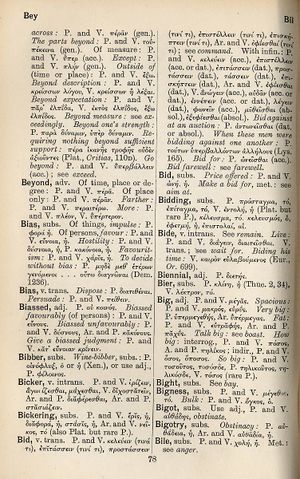bide: Difference between revisions
From LSJ
δυνατὰ δὲ οἱ προύχοντες πράσσουσι καὶ οἱ ἀσθενεῖς ξυγχωροῦσιν → the strong do what they will; the weak do what they must | the strong do what they can and the weak suffer what they must | they that have odds of power exact as much as they can, and the weak yield to such conditions as they can get
(CSV3) |
m (Woodhouse1 replacement) |
||
| Line 1: | Line 1: | ||
{{Woodhouse1 | {{Woodhouse1 | ||
|Text=[[File:woodhouse_78.jpg|thumb|link={{filepath:woodhouse_78.jpg}}]] | |Text=[[File:woodhouse_78.jpg|thumb|link={{filepath:woodhouse_78.jpg}}]] | ||
===verb intransitive=== | |||
See [[remain]]. | See [[remain]]. | ||
[[live]]: [[prose|P.]] and [[verse|V.]] [[διάγειν]], [[διαιτεῖσθαι]]. | |||
'''verb transitive''' see [[wait for]]. | |||
[[biding his time]]: [[verse|V.]] [[καιρὸν εὐλαβούμενος]] ([[Euripides|Eur.]], ''[[Orestes]]'' 699). | |||
}} | }} | ||
Revision as of 08:57, 20 May 2020
English > Greek (Woodhouse)
verb intransitive
See remain.
live: P. and V. διάγειν, διαιτεῖσθαι.
verb transitive see wait for.
biding his time: V. καιρὸν εὐλαβούμενος (Eur., Orestes 699).

